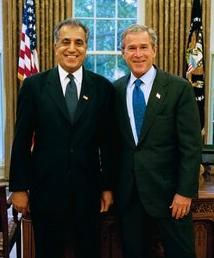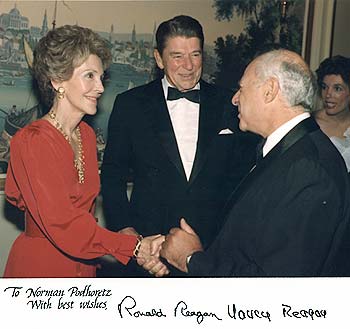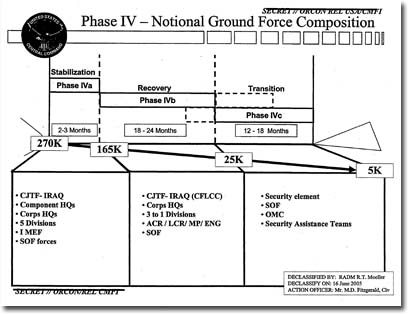Der Irak-Reporter des New Yorker, George Packer, hat ein grosses Stück über die Pläne und Szenarios für einen amerikanischen Rückzug geschrieben, den man lesen sollte („Planning for Defeat“). Packer hat auch ein interessantes Blog. Da veröffentlicht er Auszüge aus Gesprächen, die er nicht verwenden konnte – etwa mit Lee Hamilton (vom Baker-Hamilton-Report) und mit Zalmay Khalilzad, dem ehemaligen Afghanistan-Berater der Bush-Regierung und US-Botschafter im Irak, heute UN-Botschafter der Vereinigten Staaten. Khalilzad, der letzte verbliebene Neocon (der allerdings Kreide gefressen hat), sagt ein paar kluge (und beängstigende) Dinge in dem Interview:
And the region is so important for the world now. I compare it to Europe in the first part of the twentieth century, when most of the world’s security problems came from that dysfunctional region, and now we’ve got this region that’s causing all these difficulties.

Würde man heute so auch nicht mehr machen: Khalilzad beim Chef, 2003 Foto: White House
The ultimate beneficiaries of a regional war might be radical Islamists, whom Khalilzad sees as representing a tendency that’s at the heart of Islam itself:
This sort of scenario could strengthen a streak within Islam which is present in its doctrine but is not shared by everybody who is Muslim. In this time, when there is a crisis of Islamic civilization about how to cope in this world and why Muslims are situated the way they are right now, there is a stream which says, “We have to go to a kind of puritanical Islamic rule and fight against the Christians or others until the world is Muslim. There cannot be peace until we have converted everybody to Islam.” That streak exists in the doctrine; if you do a hermeneutical analysis of the texts it is there, but it is not dominant. It depends on the interpretation. The question is, Is it a reasonable, moderate, rational, civilized interpretation, or is it barbaric, extremist, uncivilized? But there is in Islam that element, and that element is assisted by some of the things that are happening to be more pronounced. And I believe that this crisis of Islam at the present time—and what we talked about in Iraq in particular—goes beyond Iraq. This is the issue of our time, geopolitically. It’s not a handful of people; it’s a huge crisis. I think that this affects a lot of people around the world, not only us. This is a threat to Europe—there’s no question they are afraid of Islamic extremism in Europe.





